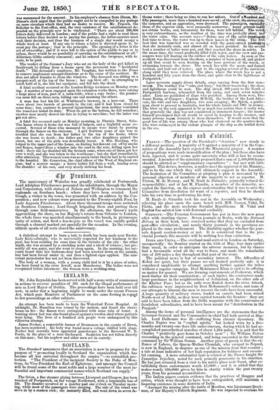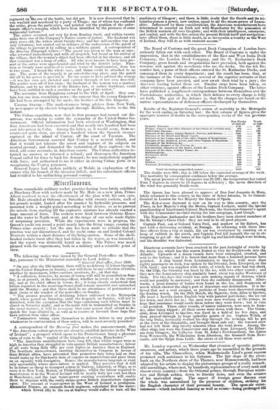intrign and
FRANCE.—The question of the President's " dotation " now stands in a different position. A majority of 9 against a minority of 5 in the Com- mittee of the Assembly have rejected the Ministerial project. A number of propositions were made in modification of the plan ; but these also have been rejected, and it seems quite uncertain what will at last be recom- mended. A member of the minority proposed that a sum of 2,400,000 francs should be allotted as " supplementary expenditure " ; but met with little support. This device, however, is said to meet the approval of the Ministry, and to be the one which they will ultimately support in the Assembly. The hesitation of the Committee at adopting a plan is increased by the personal objection of members of the majority to act as reporter. M. Creton, M. de Mornay, and M. Soult de Dalmatie, pointedly refused the responsibility; and at last M. Flandin, a member of the minority, ac- cepted the function, on the express understanding that it was to save the Committee from dissolution for want of a reporter, and that he should take his own time in performing his duty. M. Emile de Girardin took his seat in the Assembly on Wednesday; selecting his place upon the same bench with MM. Carnet, Vidal, Do Flotte, and the more moderate Socialist Republicans. M. Vidal and Eugene Sue saluted him with fraternal cordiality. Giuue&xY.—The Prussian Government has put in force the new press edict with startling vigour. Seven journals in Berlin, with the National Zeitung at their head, have received notice that they are excluded from post-office circulation; and nearly thirty journals in the provinces are placed in the same predicament. The disability applies whether the jour- nals deposit caution-money or not. It is considered that to the pro- vincial journals this measure will be nothing less than extinction. INDIA AND Cur/ca.—The overland mail arrived in London on Saturday, unexpectedly : the Bombay started on the 11th of May, four days earlier than usual, in order to anticipate the adverse monsoon, but by chance had a favourable wind all the way to Suez, and made the remarkable rate of 290 miles a day throughout that part of the route. The political news is but of secondary interest. The Affreedies of Kohat are quiet, but their passes are not deemed perfectly safe : it is considered unadvisable to attempt anything further against the tribes without a regular campaign. Dost Mohammed lata.n is said to be offering us matter for quarrel. We are forming cantonments at Peshawur, which need timber for their construction ; of such timber the contractors made large purchases in the neighbourhood of Jcllalabad, on the other side of the Khyber Pass ; but as the rafts were floated down the river Attock, the raftsmen were imprisoned by Dost Mohammed's orders, and none of our attempts to liberate the men or recover the rafts have been successful. A large quantity of military stores, loaded on camels, had been seized North-west of Delhi, as they were carried towards the frontier : they are said to have been taken from the Delhi magazine with the connivance of fraudulent subordinates, and to have been meant for "distribution in the Punjaub." Among the items of personal intelligence are the statements that the Governor-General and the Commander-in-chief had both arrived at Sim- lab. Lord Dalhousie was ill—suffering from chronic dysentery. Sir Charles Napier was in " capital spirits," but looked worn by a five- months and twenty-one days life under canvass, during which he had ac- complished parenthetical marches of about 1,264 miles. It is said that Sir Charles "positively goes home in October next" ; Sir William Cotton succeeding in the general command, and being succeeded in the Bombay, command by Sir William Gomm. Another piece of gossip is that the ex-
Ranee of Lahore, the Queen-Mother Chundah, who escaped to Nepaul,
is now in England, in disguise as one of the mission from that country ; a tale at least indicative of her high reputation for boldness and allee888- ful cunning. A more substantial trait is related of the Parsee knight Sir Jamsetjee Jejeeboy, noted for such princely generosity in his charities. He has just returned from a visit to his native place near Surat, after es- tablishing there endowments worth 47,000/. ; and it is added that this makes nearly 350,0001. given by him in charity within the past twenty years, from his personal accumulations. The Indian papers contain evidence that the practices of thuggee and suttee, which were thought to have been extinguished, still maintain a lingering existence in some districts of India.
"Amongst the missing after the battle of Moodkee, was Lieutenant Brock- man, of her Majesty's Fiftieth Regiment He was expected to overtake his
regiment entitle eve of the battle, but did not. It is now discovered that he was waylaid and murdered by a party of Thugs ; one of whom has confessed the crime, given the particulars, and pointed out the position of the unfor- tunate officer's remains, which have been identified by the presence of some
•
regimental buttons." The suttee occurred not very far from Bombay itself, and within twenty miles from one of the Company's Native courts of justice. The husband was sixty years old, the widow about twenty-two ; and her self-sacrifice was not only voluntary, but carried out in defiance of the endeavours of the patell of the village to prevent it by calling in a military guard. A correspondent of the Bombay Telegraph writes—" The guard was given to the man at once who returned immediately and with all despatch, but found on his arrival at the village, that the woman's object had been effected in his absence, and all that remained was a heap of ashes. All who were known to have been pre- sent at the suttee were apprehended and tried by the district judge. Nme- teen or twenty were sentenced to various terms of imprisonment, from ten to two years. I heard the whole case, and blame could be attached to no one. The scene of the tragedy is an out-of-the-way place, and the patell did all in his power to prevent it. No one seems to have advised the woman —it was her own act, dictated and carried through of her own free-will. The parties were all of low easte : the husband of the woman was a spurious Brahmin, and by no stretch of the Hindoo law, or rather traditions, could have-been entitled to such a sacrifice on the part of his widow."
The accounts from Hongkong extend to the 24th of April: they con- tain but one item resembling news—the rumour that the young Emperor's life had been attempted by his uncle, the brother of the late Emperor.
UkilTRD STAvns.—The mail-steamers bring advises from New York, by newspaper or by electric telegraph through Halifax, down to the 8th instant.
The Cuban expedition, now that its first passages had turned out dis- astrous, was seeming to enlist the sympathy of the United States Go- vernment. Official information had been received at Washington, that four Americans had been executed and that nearly two hundred had been cast into prison in Cuba. Among the latter, as it would seem, from ac- counts not quite clear, are about a hundred whom the Spanish steamer captured on the island of Contoy, off the coast of Yucatan. The American Government asserted that Contoy is a neutral island, and that it would not tolerate the arrest and capture of its subjects on neutral ground; and demanded the restoration of these captives—to be tried, add some accounts, in American courts. The Cuban authorities re- turned no answer, or returned a refusal; and thereupon the American Consul called for force to back his demand ; he was immediately supplied with force, and authorized to use it either in dosing Cuban ports or in recapturing the Contoy prisoners. General Lopez had spoken publicly at Mobile in explanation of the causes why his branch of the invasion failed; and his subordinate officers had testified to his unflinching personal courage.



























 Previous page
Previous page